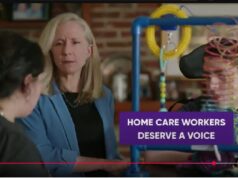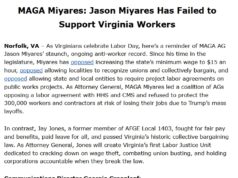From the Commonwealth Institute for Fiscal Analysis:
New Minimum Wage Legislation Will Strengthen Virginia’s Families & Economy
Nearly 800,000 people will benefit, including essential workers during COVID-19
In the 2020 session, the General Assembly passed historic legislation to increase the minimum wage in Virginia for the first time in more than 11 years. The bill, if signed into law, will increase the minimum wage from $7.25 to $9.50 on January 1, 2021. Virginia’s minimum wage would reach $12 by 2023. The discussion in this piece:
- Explains how minimum wage increases help to stimulate the economy, including in times of recession.
- Demonstrates that many working people who are assisting our communities during the COVID-19 pandemic would benefit from a higher minimum wage.
- Highlights how increasing the minimum wage is of particular importance to working people of color in Virginia.
Given current events related to the COVID-19 pandemic, raising the minimum wage has become even more essential for Virginia’s working families and for our economy. While the immediate focus must be on emergency efforts at the federal, state, and local level to “flatten the curve,” provide medical staff the resources they need, and deliver immediate and targeted economic relief to families and businesses most impacted, Virginia’s policy makers must also stay focused on a key driver of growth: strong consumer demand. Indeed, consumer spending on goods and services accounts for roughly 72% of Virginia’s Gross Domestic Product (GDP). For that reason, in the months ahead, restoring and accelerating consumer demand must be a priority to help Virginia’s economy thrive.
Pursuant to the new legislation that passed the General Assembly, the first increase in the minimum wage will take effect in approximately nine months, which will help bolster Virginia’s working families and, critically, strengthen their buying power. This is important not only because higher wages will benefit families who are already living paycheck to paycheck, but also because people in low-wage jobs are more likely to immediately spend any extra income on ordinary and necessary living expenses. In the aggregate, this fuels economic growth.
Overall, the minimum wage legislation is expected to benefit nearly 800,000 people by 2023, but the benefits for Virginia’s workers and our economy would begin even earlier, as summarized below:
| Year | Minimum Wage | Total Virginia Workers Impacted | Total Workers of Color Impacted |
Change In Average Annual Earnings For All Impacted Workers | Impacted Workers With Annual Household Incomes Below $50,000 |
| 2021 | $9.50 | 409,000 | 207,000 | + $881 | 229,000 |
| 2022 | $11.00 | 691,000 | 350,000 | +$1,412 | 387,000 |
| 2023 | $12.00 | 788,000 | 398,000 | +1,890 | 439,000 |
Given that people in low-wage jobs are more likely to put any extra earnings back into the economy, the gradual, but predictable, increases in the minimum wage will help to lift consumer spending. In 2021 alone, a minimum wage of $9.50 would lift average annual earnings by $881 for all impacted workers in Virginia. With future increases, that figure will grow to more than $1,400 in 2022 and nearly $2,000 in 2023. Compare that, for example, with the idea of a temporary payroll tax cut. By one estimate, it would take over 3 years for full-time minimum wage employees earning $7.25 per hour to see a $1,000 benefit from a 2 percentage point payroll tax cut.
On this issue, history holds lessons for policymakers. The most recent increase in the federal minimum wage occurred in July 2009, when the economy was in significant turmoil due to the financial and housing market crash that became the Great Recession. During that period, the minimum wage increased to $5.85 in 2007, $6.55 in 2008, and finally $7.25 in 2009. Economic analyses of those increases found no significant impact on employment levels in the United States, even in the midst of a major recession. These three wage increases did, however, boost consumer spending at a time when the economy needed stimulus. Overall, the increases resulted in an estimated $10.4 billion of additional consumer spending between August 2007 and July 2009. To provide another example, the federal minimum wage increased to $3.80 in 1990 and $4.25 in 1991, which coincided with a recession in the United States. In subsequent studies of these increases, economists found little to no impact on employment levels or benefits offered to employees.
The COVID-19 pandemic also serves as a reminder that many essential jobs in our economy are minimum wage jobs. From the people who are on the front lines of our health care system to those who make sure our families have food to put on the table, these workers provide important services to our communities. Gov. Northam, in the context of COVID-19, has declared that many of these businesses, and the people they employ, are essential. The new minimum wage legislation will deliver well-deserved raises to thousands of people who work in critical sectors in the commonwealth:
|
Year
|
Health Care Workers | Restaurants & Food Service Workers | Retail Trade Workers (e.g. Grocery Stores) |
| 2021 | 46,200 | 107,800 | 100,800 |
| 2022 | 88,500 | 143,700 | 167,400 |
| 2023 | 103,600 | 155,300 | 187,400 |
At the same time, increases in the minimum wage will help to create a more equitable economy. More than half of all workers who will benefit from a stronger minimum wage are workers of color. By 2023, nearly 400,000 working people of color in the commonwealth will have greater economic security. Our current minimum wage has been eroding for decades and is already the lowest in the nation, when considering the typical cost of living in the commonwealth. People who are paid the minimum wage earn less per hour today than their counterparts did 50 years ago, after adjusting for inflation.
Moving forward, the minimum wage legislation that passed the General Assembly will prove to be an asset by strengthening Virginia’s working families and by stimulating consumer spending that propels economic growth.
— Phil Hernandez, Senior Policy Fellow & Counsel















